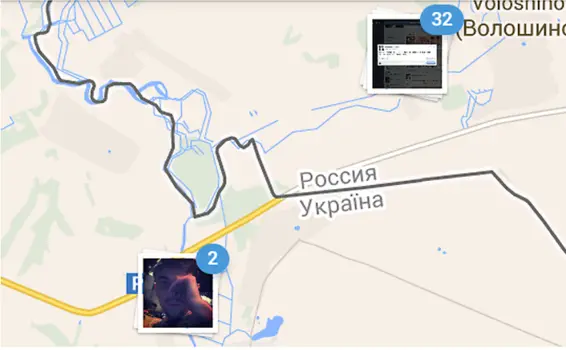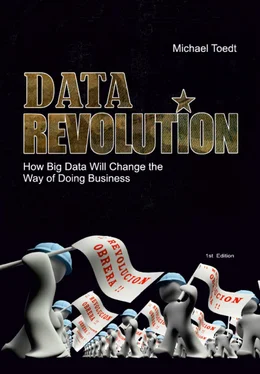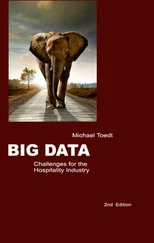One central goal of Big Data is to provide added value to the customer. Thus, it seems logical that the marketing department takes the lead in Big Data initiatives. This, however, requires profound analytical and technology skills on the management level, as well as additional competencies and responsibilities. The quality of marketing within a Big Data environment goes beyond appealing design. It is characterized by a real-time content delivery process, which provides offers and information to the recipients based on their individual needs.
 Increase of profitability by up to 100%
Increase of profitability by up to 100%
Big Data can help especially hotels to push direct distribution, which results in higher profit margins. Therefor, Hotels should start using Big Data in order to counter-act the loss of business to costly third-party vendors. Big Data can help to secure the competitive advantage and to increase profitability by up to 100%. The biggest obstacles are the lack of expertise within the senior management and the reluctance to implement the necessary technical, organizational, structural and HR changes.
This book provides an evaluation of the significance of Big Data and targets managers on a senior level and everyone who is interested in this topic. Many examples help to show the current situation and to explain the changes, which are necessary to deal with the challenges associated with the current revolution of doing business – the data revolution.
Part A: Data Revolution – Michael Toedt
“ The Internet is among the few things humans have created, but do not truly understand. It is intangible and constantly changing, growing and getting more complex with each passing second. It is a source of tremendous good and potentially dreadful evil, we are just beginning to witness on the world stage .”
Eric Schmidt, CEO of Google, wrote this in his book “The New Digital Age - Reshaping the Future of People, Nations and Business”.
By replacing the term “Internet” with “Big Data” it can be described where we are right now:
Big Data is among the few things humans have created, but do not truly understand. It is at intangible and constantly changing, growing, and getting more complex with each passing second. It is a source of tremendous good and potentially dreadful evil, we are just beginning to witness on the world stage. 1
When we talk about Big Data, we talk about the steadily increasing volume of data and the opportunities, which comes with it. Critics say that Big Data is not a new topic, but only a new and trendy marketing term created by software and consulting companies. The press is full of articles and everyone talks about it. Especially since Edward Snowden Big Data has become a topic with a negative connotation. Snowden used to work for Booz Allen Hamilton, a consulting firm hired by the US National Security Agency (NSA). In June 2013, he disclosed thousands of classified documents that he acquired as an insider working for the NSA. The release of confidential NSA material was the most significant leak in US history. 2The basis for Snowden’s release was the fact that after 9/11 the NSA had started to collect data from almost everywhere. The data volumes and sources as well as the possibilities made people and governments all over the world feel insecure, and have resulted in worldwide protests against the NSA and the US government.
Since Snowden has been in the news over months Big Data has become the talk of the town. Hearing about the practices of intelligence services around the world, people started to question what companies can do with data and how this may change our lives in the future. Big Data has become a buzzword and many people talk about it without knowing much about it.

Figure 1: Google Searches on „Big Data“ 3
Companies have always collected data, but a lot has changed including the pace with which data is generated and collected, and the vast number of sources where data can be pulled from. Our life has become digital and without even knowing we leave our digital footprints everywhere we go. These facts have led to an exponential growth of data in the past years. The basis of Big Data is the amount of data available and the possibilities that come with it.
The technological achievements of the last decades have built the foundation for the current revolution. The development of powerful database management systems and network capabilities, decreasing costs for hardware, software and storage, the triumphant success of the Internet and its evolution through social media are responsible for the current changes. In addition to Facebook and other social media platforms, mainly the launch of the iPhone in 2007 has led to the explosion of data. The Steve Jobs and Apple achieved to revolutionariz the mobile phone market. From a more or less unemotional device with no additional functions, the mobile phone has turned into a status symbol with multi-media functions providing Internet access everywhere and at any time. This connectivity enables to collect and to use data.
Worldwide, about 1. 8 billion mobile phones have been sold in 2013, 53% of which, and growing, were Smart Phones. 4Today, even the youngest in our society - 80% of the ten to thirteen year olds and still 33% of the six to nine year olds - possess a mobile phone. It has become normal to grow up with a smart phone and a computer. No wonder that 82% of the kids under 13 are computer-savvy and almost 60% use the Internet on a daily basis. 5
The triumphant success of smart phones led to the creation of billions of mobile applications, which cater to the users’ needs and provide for entertainment for all situations. The small programs are just a fingertip away and are available for almost all aspects of life. The side effect is, however, that they track and store everything the user does. Many apps are free, but actually, the user pays a price, just in a different currency. The currency is data and the price is the amount of data the app collects. The provider uses the data to learn about the user, a knowledge he will try to capitalize on in the future.
In 2012, Facebook took over Instagram a photo sharing and social media community with 30 million users at the time. The purchase price was about $1 billion, 6a ridiculous amount for a company with only 13 employees. In addition to the unique functionalities of Instagram, the motivation of Facebook for the take-over was probably a different one and most likely had something to do with the data Instagram collects with each transaction by a community member. With each picture taken the GPS coordinates and further data including date, time, and the name and type of the device with which the photo was taken, are collected. The GPS tracking tool shows on a map where the picture was taken, which is a nice and helpful feature for users.
Where this can lead to shows the following example. In summer 2014, during the Ukraine crises, however, the Russian government was at a loss to explain the following. Alexander Sotkin, a Russian soldier, took several selfies and posted them on Instragram. Against the firm assureances of Russian politicians that no Russian soldiers supported the separatists in the East-Ukraine, the map view on Instragram clearly showed that the pictures were taken on Ukraine territory.

Figure 2: Russion Soldiers in the East Ukraine reveiled by Instragram 7
Читать дальше

 Increase of profitability by up to 100%
Increase of profitability by up to 100%












